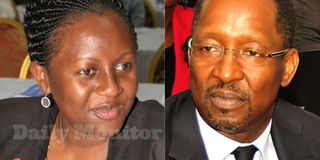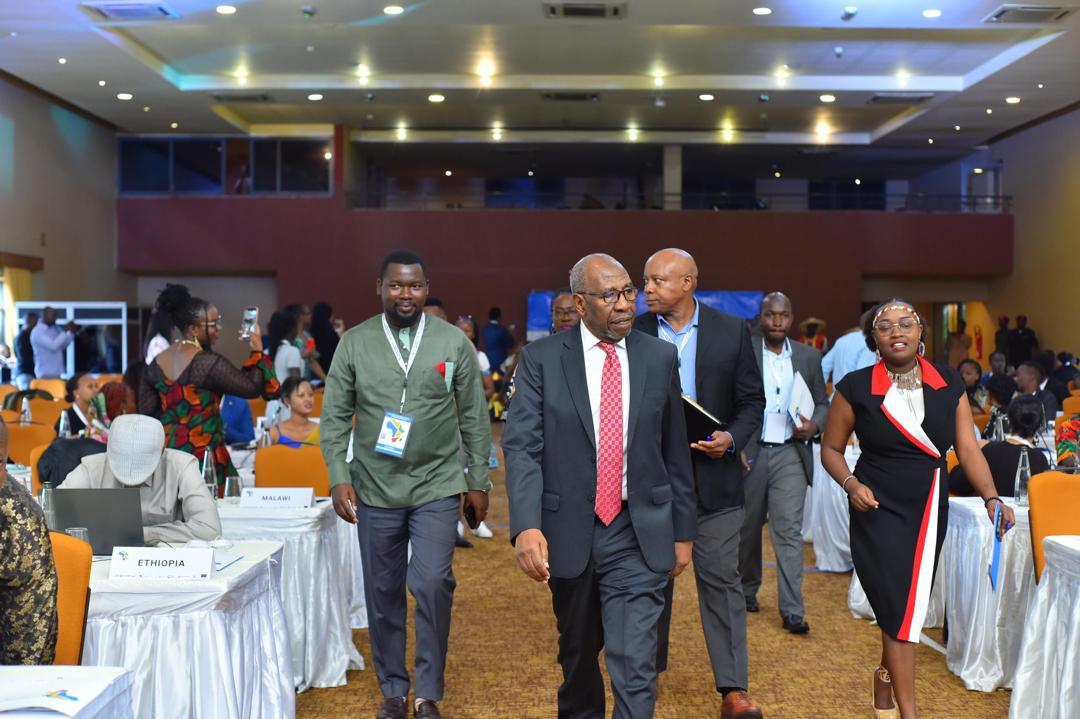Prime
Trouble at NSSF as MD, deputy disagree

NSSF deputy MD Geraldine Ssali (L) and the Fund’s MD Richard Byarugaba.
What you need to know:
Resilient. The Fund’s board sent the deputy MD on forced leave, which she declined saying the board had no authority to make her leave.
KAMPALA. The High Court in Kampala on Monday issued an interim order freezing the decision of the board to suspend the National Social Security Fund deputy managing director, Ms Geraldine Ssali, who has fallen out with the Fund‘s managing director Richard Byarugaba.
The board accuses Ms Ssali of insubordination and misconduct and undermining Mr Byarugaba’s position.
However, Hight Court deputy registrar Alex Ajiji has put on hold the board decision until hearing of the substantive application in which Ms Ssali is appealing for fairness is heard on April 4.
Ms Ssali, through her lawyer Rogers Bikala, on Friday last week sued the Fund and its board chairman Patrick Kaberenge seeking judicial review after the latter forced her to take leave on March 9 to reportedly pave way for an inquiry into her conduct.
On Monday before court, the NSSF’s lawyers indicated that the board sitting on the same day had now decided that Ms Ssali is put under “investigative suspension” with immediate effect and, therefore, her arguments in the affidavit filed last Friday had been overtaken by events.
Mr Ajiji, however, set aside both decisions arguing that the applicant had not been accorded fair hearing. Ms Ssali among others also contends that the board does not have the powers to suspend, whatsoever, but rather the power lies with the Minister of Finance, the appointing authority.
The NSSF management in a statement issued on Monday said: “The Fund respects the decision of court to maintain the status quo of Ms Ssali.”
The board is expected to sit again on March 30 to chart a way forward.
History of the standoff between the two
The case illuminates a long-simmering row mainly over power at the top echelon of the Shs6 trillion Worker’s Fund. On the one side is Ms Ssali, whose three-year contract as deputy MD was renewed in 2014, and on the other managing director Richard Byarugaba, whose contract was also renewed the same year after a topsy-turvy search process to fill top management positions. The search process was preceded by an investigation by the Inspector General of Government into mismanagement of the Fund, but which cleared the two top officials, and asked the board to reprimand Mr Byarugaba.
The new board led by Mr Kaberenge, which was constituted by the Finance ministry last September, has since landed into the power games of the two top officials and at their sitting on March 30 are expected to discuss the matter at length with a view to finding a lasting solution to the long-standing bad-blood between the two, and make “appropriate recommendation(s) to the appointing authority, the Minister of Finance”, according to NSSF internal documents.
One of the most memorable display of the row between the two top Fund managers was sometime in 2014, when Mr Byarugaba, while appearing before a parliamentary probe into NSSF’s investment in Umeme shares, said he was being fought by cliques in the Fund who included Ms Ssali. The cliques, he said, were bent on frustrating his job and are adamant to new changes to turn around the workers’ Fund.
Mr Byarugaba at the time was out office; his first contract having run out, and then Finance minister Maria Kiwanuka was keen on not having it renewed until President Museveni ordered so.
Meanwhile, Ms Ssali was holding fort, and on whose authority the Fund would later buy an extra 100 million Umeme shares at Shs34b. The deal, much as was criticised for having short-circuited authority, later turned out to be a profitable venture for the fund. Insiders say, in this tumultuous atmosphere of parliamentary probes and increased public railing of the Fund for its investment decisions, Ms Ssali’s “confidence grew stronger” when positive results were registered.
Insiders describe Ms Ssali as a “pushy and assertive kind” and on the other hand Mr Byarugaba as “cool-headed”, the incongruity perhaps explaining the friction.
The squabbling between the two managers existed before, on the low scale “but things completely changed” when they bounced back for the second term, said one official in the Finance ministry.
Contacted, both Ms Ssali and Mr Byarugaba declined to comment on the matter saying it is before court. However, when pressed Mr Byarugaba said: “The current situation has no danger to the fund; the institution is stable and will continue working properly.”
Insiders, say Ms Ssali has questioned the authority and decisions of the board which rattled some members. The board says this is “insubordination.”
Ms Ssali was for example, last year kicked out of a board meeting to discuss increment of bonuses on worker’s savings that she wanted to attend. The meeting afterwards resolved that management [including the deputy managing director] are not authorized to sit in board meetings.
However, since 2007, the then NSSF management and the Finance ministry had sanctioned the deputy MD attend board meetings on grounds that by nature of appointment, a deputy is a substantive director of the Fund “with all related voting powers, and therefore a participating member of the board.”
The simmering apprehension went out of hand late last year. On return from leave in December, Ms Ssali wrote to the Corporation Secretary Richard Wabwire, asking him to avail her a copy of the board minutes—from the board’s first sitting in October throughout November.
At the start of year, on January 6, Mr Wabwire wrote to Mr Byarugaba, informing him of Ms Ssali’s request for the board minutes since October. “Geraldine required formal communication regarding the changes that would affect her board appointment at Housing Finance Bank and her prospective appointment to the PTA Bank following her nomination by the Board. I explained to her that whereas I was away from office and the few people retained in office could not be able to access the Board Minutes, it was also not within her remit as a non-board member to require the Board Minutes,” Mr Wabwire wrote.
Mr Wabwire added: “Unfortunately, it would appear that this was not well received. In a discourteous outburst, she accused me of “in-subordination, playing politics, pulling rank and power games. She demanded that as DMD and a statutory officer, she was aware of the applicable policies and her entitlement to the Board Minutes.”
What ensued was a confrontation between the MD and her deputy. According to correspondences, on January 7, the board chairman, Mr Kaberenge, separately met Ms Ssali to chart a way out of the stalemate. On February 29, Mr Kaberenge also separately met Mr Byarugaba on the similar matter.
On March 7, Mr Kaberenge met both the MD and DMD to chart a way forward to their stalemate but the meeting was fruitless.
In a letter to Ms Ssali on March 9, the board chairman wrote: “In my considered assessment, after the meeting, I noted no significant indication that there was a likelihood for genuine resolution of the conflict in the near future. So I have taken the decision to, “direct you to take your earned annual leave for the period July 1st 2015 to March 9th, i.e. 24 working days with immediate effect. This is to save the Fund from further business disruption and paralysis at the topmost strategic level of the Fund’s Management, while a lasting solution is sought.”
“You are also directed to handover the business and instruments of the office of the DMD to your managing director,” the letter read.
Refusal to go on leave
On the same day, however, according to correspondences seen, Ms Ssali rejected this decision.
“I received your letter but respectfully decline your directive because you are not my appointing authority, neither have you the mandate to do so. Going by the laws governing the NSSF, you are not competent to make this directive with all due respect.”
Ms Ssali argued that she had just returned from leave, and could not accept forced leave.




